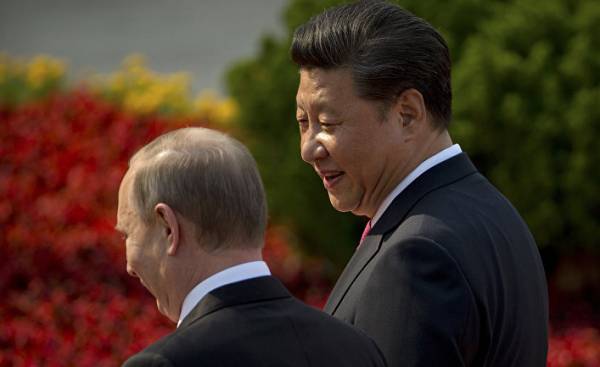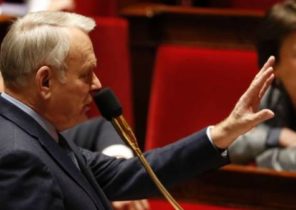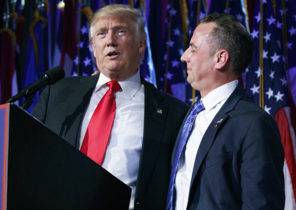
Influential Russian and Chinese leaders at the summit of G20 in Hamburg at the end of this week will compare their prepared working materials and coordinate their approaches to President Donald Trump. Both sides complain about how much they have improved in recent years relations between the two countries, while Chinese President XI Jinping visited Moscow on the way to Hamburg to participate in the work of the G20. Now, however, it is not just about vague phrases — this rhetoric is enough real content.
Regardless of whether fully or not fully official Washington sees a gradual — but profound — changes in the triangular relationship of America with Russia and China over the past decade, it is clear that the United States turned himself into a loser.
Gone are the days when Richard Nixon and Henry Kissinger skillfully used the Sino-Soviet conflict, pitting the two countries against each other and seeking concessions from each of them. Slowly but surely it is a strategic equation began to change noticeably, and the Chinese-Russian rapprochement testifies to the tectonic shift that is clearly happening to the detriment of the United States, whose actions and contribute to the rapprochement of these countries.
Today, however, few signs that influential us politicians have sufficient experience and mental capacity to understand the new reality, as well as important consequences for the freedom of action of the United States. Even less likely that they can appreciate how these new relationships will look like on the ground, at sea and in the air.
Instead, the administration trump, following the same path that the Bush administration and Obama, is acting arrogant and with a sense of justification for actions: she was subjected to missile attack Syria and shoots down Syrian plane, making a fuss about Ukraine, and also send warships to the coast of China.
However, consider the following: maybe in the near future China will be able to challenge the “interests of the United States” in the South China sea or the Taiwan Straits, and all this will happen against the background of us-Russian clashes in the skies over Syria or confrontation in Ukraine.
The lack of experience or intellectual abilities — this may be too generous an interpretation. It is more likely that Washington’s behavior is a mixture of normal naive concept of exclusivity and constant influence of the American military lobby — the Pentagon and the other players deep state (deep state) — and all these components are intended to prevent any easing of tension in relations with Russia or China. Ultimately, the arousal of fear against Russia or China is a proven method to build new aircraft carrier or some other expensive weapons systems.
It’s almost like in the old days, when the us military received a budget that allowed them to wage wars on multiple fronts simultaneously. That’s what happened in the past few weeks:
— Destroyer USS Stethem guided missile on Board on Sunday went to a 12-mile area of one of the Paracel Islands (Triton) in the South China sea, to which China puts forward. The Ministry of foreign Affairs of China immediately called the action “a serious political and military provocation.”
— Last week the United States announced the sale to Taiwan of arms worth $ 1.4 billion, imposed sanctions against a Chinese Bank over its transactions with North Korea and called China a major illicit trafficker.
— On 20 June President Donald trump has published a condescending in tone a message on Twitter which said that China made an unsuccessful attempt to stop the nuclear program of North Korea: “It didn’t work. At least I know that China tried to do it” (for many centuries China had a bad experience with the indulgence of the West).
General concern: missile defense
On the eve of his visit to Moscow, XI gave an interview to the Russian news Agency TASS, in which he focused on missile defence — that is the question that is especially important for Vladimir Putin. Si has focused on placing the United States in South Korea of elements of system of high-Altitude zonal missile defense in the theater of military operations (THAAD). He called these steps of Washington, “violate the strategic balance in the region” and threatening the interests of the security of all countries, including Russia and China.
Si also confirmed that Beijing urged Washington and Seoul to cease to exert military pressure on North Korea. He even expressed the hope that the new President of South Korea will act more wisely than his predecessor, who agreed with this placement that made the North even more to worry about a possible preemptive strike (during February this year on-line seminar Professor J. J. su (J. J. Suh) and I discussed the THAAD in the historical perspective relating to the creation of anti-missile systems).
Less than a month ago, Putin and XI met in the Kazakh capital Astana on the sidelines of the summit of the Shanghai cooperation organization. Then Putin said that the forthcoming bilateral meeting (currently she is in Moscow) is “an important event in bilateral relations.”
“Of course, as has become a tradition in our tradition, we use every opportunity to meet and talk about our bilateral relations and the international agenda”, — he stressed.
If the Chinese-Russian “tradition” is applicable to the events that took place over 30 years ago, Putin is clearly exaggerating. It was not always. Changeable half-century retrospective of Russian-Chinese relations indicate that they are on a difficult path. But even more important is the fact that their current proximity is unlikely to evaporate soon.
Like underground geological formations, moving slowly beneath the Earth’s surface, changes with large-scale political repercussions can occur so slowly that it will not be noticeable before the earthquake. When I was the chief CIA analyst on China-Russian relations in the 1960-ies and early 1970-ies, I had an advantageous position to observe how there are new signs of intense hostility between Russia and China and how Nixon and Kissinger, ultimately, were able to take advantage of this in the interests of Washington.
The claims of these two neighboring Asian States had included requirements regarding the reunification of the territories — China demanded the return of 1.5 million square kilometers of territory in Siberia, taken from China based on the “unequal Treaty” 1689. This led to several armed clashes in the 1960s and 1970s years on the border in the area of the river, to the Islands which were claimed by both sides.
In the late 1960-ies, Russia has increased its military forces on the border with China from 13 to 21 divisions. By 1971 the number increased to 44, and Chinese leaders began to see in Russia a more immediate threat than the United States, which in the 1950-ies fought against the Chinese armed forces during the Korean war. Washington refused to recognize the diplomatic level, the Communist government of this country and continued to maintain the illusion regarding the fact that Taiwan Chiang Kai-shek continues to be the legitimate ruler of China.
In 1971, Henry Kissinger visited Beijing in preparation for the visit of President Richard Nixon — he was held the following year, thereby violating an earlier tradition. This was followed by a very creative diplomatic steps under the control of Kissinger and Nixon, the aim of which was to: take advantage of the fear that China and the Soviet Union experienced in relation to each other, and the imperative, which forced each side to try to improve ties with Washington.
Triangular diplomacy
Skillful use of Washington for its relatively strong position in the triangle of these relations helped implement a major agreement on arms control between the United States and the Soviet Union and the conclusion of the Quadripartite agreement on Berlin. The USSR went even further and accused China of hindering a peaceful settlement in Vietnam. It was one of those happy coincidences that allow analysts to abandon often imposed on us the role of man, all interfering with his presence. Instead, we were able to faithfully capture the impact of this approach on the part of the United States and draw conclusions about what it allows to achieve the desired result. Since this approach was such.
The animosity between Beijing and Moscow was extremely obvious. In early 1972, in the period between the first Nixon’s summits in Beijing and Moscow, our analytic reports underscored that the Chinese-Soviet conflict is for both parties very negative phenomenon.
Both countries are not only deprived of the benefits of cooperation, but were forced to make a tremendous effort in order to nullify the negative impact of the policies of the opposite side. A significant dimension to the conflict were added at the time when the United States began to improve relations simultaneously with both countries. China and the Soviet Union were members of a race, whose aim was the cultivation of good relations with the United States.
The Soviet and Chinese leaders could not fail to notice how all this strengthens the negotiating positions of Washington. However, CIA analysts believed that relations between the two countries was the consolidation of fatal hostility, deeply rooted views of hostility, in which national, ideological and racial factors only reinforce each other.
While both sides understand what they have to pay the price, none of them seemed to have not been able to find a way out of the situation. In our opinion, the only way to improve relations was connected with the hope that in each of these countries will be more sensible leaders. But in that moment, such expectations seemed illusory.
However, we made a mistake in this matter. The successors of Mao Zedong and Nikita Khrushchev, as it turned out, had cooler heads. United States during the presidency of Jimmy Carter in 1979, finally recognized the Communist government of China, and the dynamics of the triangular relations between the United States, China and the Soviet Union began to change gradually, while the tension in relations between Beijing and Moscow began to weaken.
Yes, it took years to get rid of deep-rooted mistrust in relations between the Soviet Union and China, but by the middle of 1980-ies we, analysts, have warned policymakers that “normalization” of relations between Moscow and Beijing is slowly but surely happening despite the continuing statement of China that it will be possible only if the Russians agree to all requirements of China. Soviet leaders, for their part, began more to feel comfortable in this type of environment and not suffered from the negative consequences of unbridled competition with China to establish better relations with Washington.
The new reality
However, we do not particularly miss the past, when in early October 2004, Russian President Vladimir Putin visited Beijing to sign an agreement with Beijing on the issue of the border and boastfully declared that relations between the two countries have reached “unprecedented heights.” He then also signed the agreement on mutual use of Russian energy resources.
Recovering Russia and a developing China become a potential counterweight to American hegemony as the sole superpower in the world, and this reaction Washington has accelerated its strategic maneuvers around Russia and China, its military bases and hostile alliances, and for the promotion of NATO to the borders of Russia and the “pivot to Asia” of President Obama. The United States supported a coup in Ukraine committed February 22, 2014, represents an important turning point — in the end, Russia, abandoning their previous positions, supported the request of the Crimea on reunification, and supported by an ethnic Russian rebels in Eastern Ukraine who oppose the Kiev regime came to power in a coup.
On the global stage, Putin has filled the new contents of the previous energy deal with China and signed a 30-year contract to supply natural gas worth $ 400 billion. This step helped Putin to show that imposed by the West after the events in Ukraine, sanctions pose a minor threat to the financial survival of Russia.
As a result, even greater convergence of Russia and China also began to take an amazing image of an area of convergence on international hot spots, including Ukraine and Syria. Military cooperation is also steadily increased. However, under the influence of arrogant consensus in the government of the United States and in academic circles continue to argue that, despite the significant strengthening of ties between China and Russia, each of these countries is still largely interested in maintaining good relations with the United States than with each other.
Sports slogan says, nothing is decided yet, while “sing their party the fat lady”, however, the results of what is happening on stage is already quite clear. Gone are the days when the United States had the opportunity to play off China and Russia at each other. We can only hope that the government of the United States will be people who will inform the President of trump that his Russian and Chinese colleagues sing from the same collection, and this is an unexpected result of the arrogant mistakes of his immediate predecessors. The consequences of these failures for the national security of the United States is enormous.
Ray McGovern for nearly 30 years was a CIA analyst.







